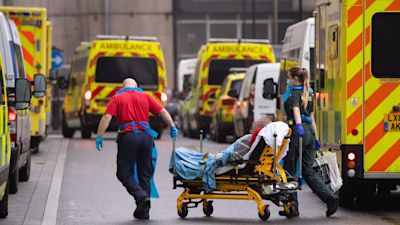Working-age adults in most deprived areas ‘3.7 times more likely to die with Covid’

"Worsening and compounding inequalities" have meant that under-65s in England’s poorest areas are more than three times as likely to die with coronavirus than those in the richest parts of the country, a nine-month inquiry has found.
Male security guards, care workers and taxi drivers are among those with the highest mortality rates.
The Health Foundation said health and wealth are “inextricably connected”, with the Covid-19 mortality rate 3.7 times higher for working-age adults in the 10% most deprived neighbourhoods.
The charity analysed data from the Office for National Statistics (ONS) and other sources between March 2020 and May 2021.
Social distancing and mask wearing in England to be scrapped from July 19, PM says
27,334 new cases of Covid in UK as government confirms easing of restrictions
Is it time to dump face masks? Here's what scientists and doctors are saying
Its research found that people in these areas had poorer underlying health which left them at greater risk when the pandemic hit.
Factors such as the type and quality of people’s employment, housing conditions and access to financial support to self-isolate contributed to increased exposure to the virus among certain groups, it found.
Once exposed, people’s pre-existing physical and mental health made them more vulnerable to severe outcomes.
Adults in their 50s and 60s living in the poorest areas were twice as likely to have at least two pre-existing long-term health conditions, such as lung disease or diabetes, according to analysis of primary care data.
People from ethnic minority communities, young or disabled people, and those with mental health conditions in particular experienced “worsening and compounding inequalities” which increased their exposure to the virus and threatened their future health.
But the Health Foundation said these risks to health are “far from inevitable” and can be addressed by a recovery plan that focuses on fairness.
The inquiry found that the way the UK recovered following the 2008 financial crisis had a “direct bearing” on the country’s resilience to the pandemic.
With public services “eroded”, it said stalling improvements in life expectancy and deepening inequalities over the next decade left the UK more vulnerable to the impacts of the pandemic.
Director of health Jo Bibby said the shortcomings of the response to the 2008 financial crisis left a “legacy of deep-rooted issues” which made the UK more vulnerable to the pandemic.
She said: “We cannot afford to make the same mistake twice. Government must address the root causes of poor health and invest in jobs, housing, education and communities. This is the only way to create a healthier society that can meet the challenge ahead and better withstand future crises”.
Polling for the charity in June found that eight in 10 people believe it is important for the government to address differences in health outcomes between those living in richer and poorer areas as the country rebuilds from the pandemic.
Listen to the ITV News coronavirus podcast:
The Health Foundation is calling for the government to prevent “longer-term scarring effects” by tackling the healthcare backlog, increasing mental health support, protecting family finances, creating jobs, and helping people catch up on education and training.
And it wants to see better resilience for the longer term, including an adequate safety net, better protections for low-paid workers, and more investment in public services to focus on prevention.
A government spokesperson said: “Any death is a tragedy and we know Covid-19 has had a disproportionate impact on certain groups including people living in deprived areas which is why Public Health England carried out a rapid review to help improve our understanding of the Covid-19 pandemic and guide the future public health response.
“There is a range of help available for those in need, including welfare support, the furlough scheme and the Test and Trace Support Payment scheme to help those experiencing financial hardship, and cannot work from home, to self-isolate”.
Why ethnic minority groups have been hit hardest by coronavirus
South Asians in England suffered more deaths than other ethnic groups